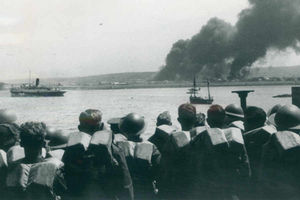Want a revolution? Send for the psychopaths
PETER RHODES on the link between mental illness and terrorism, confusion over rubber and the lads who played games on the Dunkirk beaches.

IT must be June. The first advert for Santa's Magical Lapland has popped up in my emails.
WOMEN belonging to a strict Jewish sect in London have been told not to drive, on pain of having their kids thrown out of school. This incident raises the old question of where individual liberty ends and religious observance begins. Auntie Beeb, in full preachy mode, informs us: "Be assured that there will be some very big legal brains at the Home Office grappling with this issue right now." Pardon my cynicism but I always assumed the really big legal brains were working for far bigger bucks than Whitehall pays.
MORE than 20 years ago an English university carried out research into the thought processes of people convicted of arson, assault and other crimes in the name of animal rights. They discovered that some of these characters had the same mind-set as the terrorist of Northern Ireland. They believed their cause was so overwhelmingly right that it excused any crime, up to and including murder. They felt no shame, no remorse. They were, quite simply, psychopaths. The university in question was so fearful of retaliation that it asked not to be identified. I was reminded of that research a few days ago by Max Pemberton, the media psychiatrist. He had a colleague in Ulster who recalled that during the Troubles: "There were hardly any violent psychopaths being cared for by the mental-health services. The reason? They were all political prisoners." The lesson, from Belfast to Baghdad, seems to be that the moment any movement crosses the line from peaceful debate to planting bombs, the revolution depends on lunatics.
UNTOLD history. This was the day, 75 years ago, when a Territorial battalion from the Black Country set a record you won't find in any official military history. The 1st/6th Battalion of the South Staffordshire Regiment had a wretched time in France as the Germans invaded in the spring of 1940. First, the battalion was split up into labour parties, digging trenches for regular units. Later, driven back by tanks and artillery fire, they knew they had been well and truly defeated. And yet on the beaches at Dunkirk, their community spirit took over. They kept busy. They played sports. Someone found a couple of discarded motorcycles and organised races. Stragglers from other regiments saw the cohesion and morale of the Black Country lads and attached themselves to the battalion to be evacuated. Which is why the 1st/6th South Staffordshire Regiment claimed the distinction of being the only unit in the British Expeditionary Force which brought more soldiers out of France than it took in. It's not the sort of achievement you put on your regimental battle honours but it's a memory to cherish.
A CONTESTANT on Countdown (C4) was described as "a retired voluntary worker."So how does that work?
I REFERRED recently to the banging, sawing and screwing that goes on during some surgical operations. A reader tells me his surgeon videoed the operation to correct a serious compound fracture of his leg. Watching it afterwards, the patient was surprised that "among the sparkly clean stuff you'd expect, there was a hammer, something like a Black & Decker drill, a chisel and a battery screwdriver."
A READER, commenting on my piece about the UK/US confusion over the word "rubber," recalls a musician friend's embarrassment on a trip to the States. Wanting to make a correction to his musical score, he asked his host's teenage daughter if he might borrow a rubber. Frozen faces all around, apparently.





